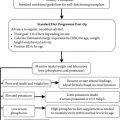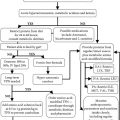9.1 Bronchopulmonary Dysplasia/Chronic Lung Disease
9.1.1 Name of Disorder
Bronchopulmonary dysplasia/chronic lung disease (BPD/CLD).
9.1.2 Clinical Definition
BPD/CLD is the result of injury to the developing lung by mechanical injury, oxygen toxicity, and infection, which results in pulmonary inflammation and damage. It includes a number of disorders involving the upper and lower respiratory tract. Bronchopulmonary dysplasia (BPD) is one form of chronic lung disease described in premature infants who may require mechanical ventilation and high concentrations of oxygen after birth.
9.1.3 How It Is Diagnosed
Premature infants and oxygen requirement at 28 days of life at 36 weeks post-conceptual age, with radiographic abnormalities consistent with diagnosis.
9.1.4 Nutritional Implications
Patients may have one or more of the following, which may change caloric requirements: increased respiration rate, chronic low oxygen saturations, chronic or acute intercurrent illness or infection, growth failure from systemic corticosteroid therapy, gastroesophageal reflux (GER), fluid sensitivity, or other nutrition-related issues concurrent with prematurity, including necrotizing enterocolitis, central nervous system changes, and other delays.
9.1.5 Pearls
- Nutritional management of BPD/CLD:
- Breast-or formula feeding.
- Nasoduodenal (ND), nasogastric (NG), G-tube or G-tube feedings with bolus of continuous drip feeds, depending on the type and placement of the tube. (Most of these infants are gradually transitioned to some oral feeds based on swallowing safety after a stabilization period of several months as well as family and nursing training.)
- Calorically enhanced breast milk, premature infant formula, and elemental formula as well as standard-term infant formula when appropriate.
- Nonnutritive oral stimulation as well as feeding therapy is initiated through speech pathology and occupational therapy/physical therapy.
- Breast-or formula feeding.
- Common medications that may affect nutrition:
- Diuretics can cause increased micronutrient loss (e.g., furosemide causes calcium loss).
- Bronchodilators.
- Sedation medications.
- Steroids.
- Diuretics can cause increased micronutrient loss (e.g., furosemide causes calcium loss).
- Medical complications affecting nutrition:
- Fluid sensitivity requires increased caloric density to meet estimated caloric and protein needs.
- GER with possible ascending aspiration requires continuous drip feeds.
- Decreased oxygen saturations during oral or bolus feeds require supplemental oxygen during feeds.
- Immature sucking, swallowing, and breathing patterns cause an increased risk of aspiration.
- Descending aspiration requires thickened viscosity of feeds or tube feeding (i.e., NG or gastrostomy).
- Fluid sensitivity requires increased caloric density to meet estimated caloric and protein needs.
- Nutrients of concern:
- Calories.
- Protein.
- Vitamins A and E.
- Electrolytes.
- Minerals.
- Vitamin D, especially with lack of sun exposure.

Stay updated, free articles. Join our Telegram channel
- Calories.

Full access? Get Clinical Tree






